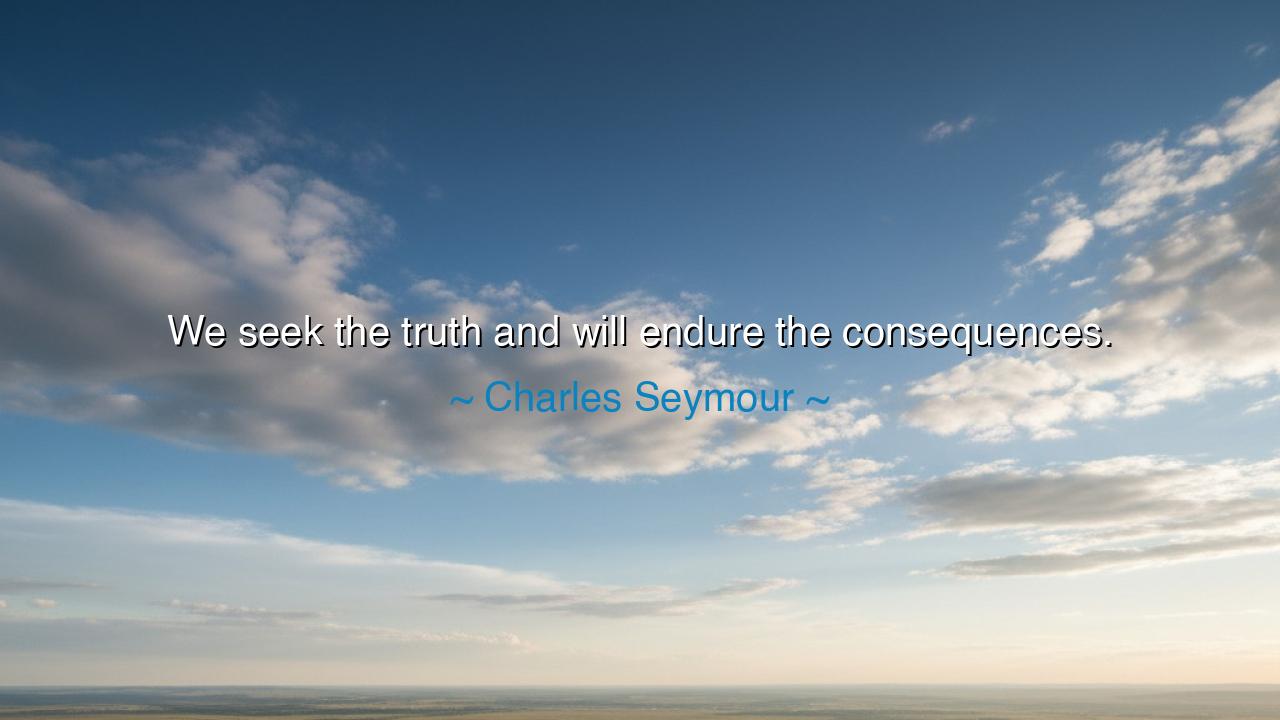
We seek the truth and will endure the consequences.






“We seek the truth and will endure the consequences.” Thus spoke Charles Seymour, historian and guardian of the record of human deeds. His words resound not only as the creed of scholarship, but as a summons to all who would walk the path of integrity. For the pursuit of truth is no gentle pastime; it is a trial by fire. It asks of us courage, for truth is often hidden, and when revealed, it wounds illusions, shakes thrones, and burns away comforting lies. To seek it is noble, but to endure the weight of its consequences—that is the mark of greatness.
The ancients themselves recognized this burden. They revered truth as divine, yet trembled at its power. For to expose truth is to expose corruption, to unmask tyranny, to hold a mirror before the soul of mankind. Socrates sought the truth of virtue, yet for his questions he drank the bitter cup of hemlock. The prophets of Israel spoke truth to kings, and many were stoned or cast out. Still, they endured, for they knew that to betray truth for safety is to betray life itself. Seymour’s words are the echo of this eternal law: truth is costly, but it is worth the price.
History gives us heroic examples. Consider Abraham Lincoln, who in the midst of a fractured nation declared that slavery was an abomination against liberty. His truth divided households, cost him friends, and brought upon him the hatred of powerful men. In the end, it cost him his life. Yet the consequence of his courage was freedom for millions and the preservation of a nation. He sought the truth of human dignity, and though he endured its terrible cost, his legacy shines like a torch for all generations.
But there are also darker tales of those who recoiled from truth. In the courts of the Inquisition, many chose silence, denying what they knew to be real, clinging to life at the expense of reality. Their names are forgotten, while the few who endured consequences—like Giordano Bruno, who refused to renounce the infinite cosmos—are remembered as martyrs of truth. Falsehood may grant safety, but it grants no honor, no immortality of spirit. Only those who embrace the burden of truth endure in memory.
Seymour’s words also speak to the scholar’s duty. For the historian, the temptation is great to write pleasing accounts, to smooth away the jagged edges of the past. But true history must be fearless. It must tell what was, not what men wish had been. Nations may resist, leaders may deny, but if the record is false, then wisdom is lost, and generations walk in darkness. Thus, to seek the truth of history is to risk scorn and wrath, but it is the only path that leads to understanding.
Children of the future, let this lesson be engraved upon your hearts: do not shrink from truth because it wounds. Do not fear its consequences, for though they may be heavy, they purify the soul. Lies may bring comfort, but it is a fleeting comfort, like the embrace of a serpent. Truth may bring pain, but it is a cleansing pain, like the surgeon’s blade that saves the body. To live in truth is to live with courage; to flee from






GDGold D.dragon
This quote makes me wonder about the role of sacrifice in the pursuit of truth. When we seek the truth, are we prepared for the emotional, social, or personal consequences? Sometimes, the truth can change relationships or perceptions in irreversible ways. How do we weigh the benefits of uncovering truth with the potential harm it can cause? Is the pursuit of truth a personal journey, or does it involve considering the greater good?
PATran Phuong Anh
Seymour’s quote implies a sense of courage in seeking the truth, but I wonder, what if the truth is destructive? Can the truth still be worth pursuing when it might hurt people or challenge established systems? Is the pursuit of truth always aligned with moral good, or does the context sometimes make it harmful? Should we consider whether the consequences of truth can be handled by everyone involved before seeking it?
TNVan Tien Nguyen
This quote made me think about the strength it takes to face uncomfortable truths. But do we always have the emotional or practical capacity to endure the consequences that come with the truth? While the pursuit of truth is noble, is it possible that seeking it can sometimes harm others, or even ourselves? When does the truth become too costly to pursue, and who decides whether it’s worth the price?
NTNga Thuy
Charles Seymour’s quote speaks to the deep commitment to truth, no matter the cost. But can we always bear the consequences of the truth? Is seeking the truth always worth it, especially when it might lead to discomfort, conflict, or even personal loss? If we know the truth will have a heavy price, do we still pursue it, or is there a point where it’s better to leave certain truths uncovered?